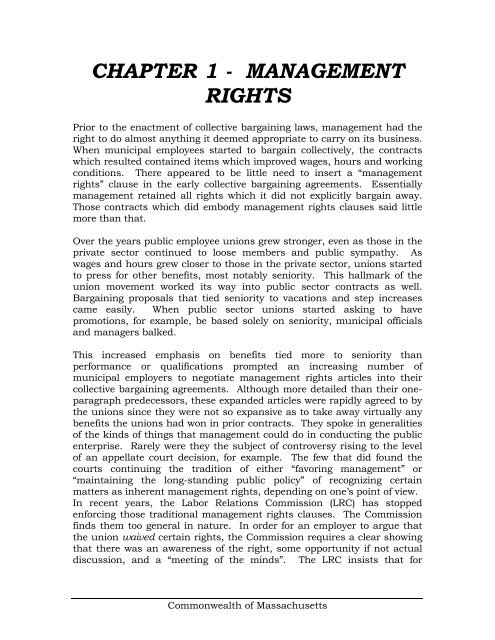Management Rights - AELE's Home Page
Management Rights - AELE's Home Page
Management Rights - AELE's Home Page
Create successful ePaper yourself
Turn your PDF publications into a flip-book with our unique Google optimized e-Paper software.
CHAPTER 1 - MANAGEMENT<br />
RIGHTS<br />
Prior to the enactment of collective bargaining laws, management had the<br />
right to do almost anything it deemed appropriate to carry on its business.<br />
When municipal employees started to bargain collectively, the contracts<br />
which resulted contained items which improved wages, hours and working<br />
conditions. There appeared to be litle need to insert a “management<br />
rights” clause in the early collective bargaining agreements. Essentially<br />
management retained all rights which it did not explicitly bargain away.<br />
Those contracts which did embody management rights clauses said little<br />
more than that.<br />
Over the years public employee unions grew stronger, even as those in the<br />
private sector continued to loose members and public sympathy. As<br />
wages and hours grew closer to those in the private sector, unions started<br />
to press for other benefits, most notably seniority. This hallmark of the<br />
union movement worked its way into public sector contracts as well.<br />
Bargaining proposals that tied seniority to vacations and step increases<br />
came easily. When public sector unions started asking to have<br />
promotions, for example, be based solely on seniority, municipal officials<br />
and managers balked.<br />
This increased emphasis on benefits tied more to seniority than<br />
performance or qualifications prompted an increasing number of<br />
municipal employers to negotiate management rights articles into their<br />
collective bargaining agreements. Although more detailed than their oneparagraph<br />
predecessors, these expanded articles were rapidly agreed to by<br />
the unions since they were not so expansive as to take away virtually any<br />
benefits the unions had won in prior contracts. They spoke in generalities<br />
of the kinds of things that management could do in conducting the public<br />
enterprise. Rarely were they the subject of controversy rising to the level<br />
of an appellate court decision, for example. The few that did found the<br />
courts continuing the tradition of either “favoring management” or<br />
“maintaining the long-standing public policy” of recognizing certain<br />
maters as inherent management rights, depending on one’s point of view.<br />
In recent years, the Labor Relations Commission (LRC) has stopped<br />
enforcing those traditional management rights clauses. The Commission<br />
finds them too general in nature. In order for an employer to argue that<br />
the union waived certain rights, the Commission requires a clear showing<br />
that there was an awareness of the right, some opportunity if not actual<br />
discussion, and a “meeting of the minds”. The LRC insists that for<br />
Commonwealth of Massachusetts
















